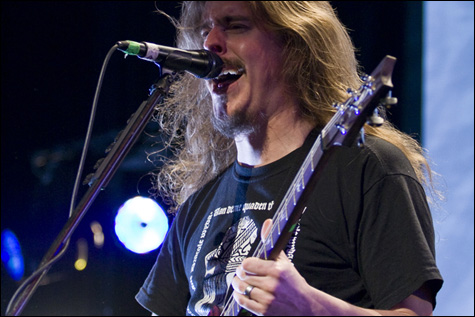
AT THE ROUNDHOUSE: Mikael Åkerfeldt’s patter is the one small patch of rust on Opeth’s gleaming colossus of ironwork. |
The Roundhouse in North London is a legendary chameleon of a venue. An imposing cylinder of Victorian brick, it began service in the 1860s as a turntable shed for rotating cumbersome steam engines. A hundred years later, after a stint as a gin warehouse, it was consecrated as a temple of guitar music. The Rolling Stones, Pink Floyd, Jimi Hendrix, and Led Zeppelin were all worshipped there in the 1960s; so were Motörhead a decade later. But as if worn out from all the chords and decibels, the Roundhouse soon retired. Only in 2006, after years of dally and delay, did it receive the refurbished, reinforced rebirth it deserved. So who better to give this morphing monolith its metallic christening on November 9 of that year than Opeth, the angelic-demonic purveyors of anthems and lullabies who fuse so many decades and purposes into their brew?
The Roundhouse Tapes (Peaceville UK) is a two-disc snapshot of that wintry night — a night on which I was fortunate enough to be perched up in the iron girders. I can verify that the recording is an expertly engineered and remarkably faithful account of how Mikael Åkerfeldt and his fellow black-clad prog-heaviness purveyors battered the audience with their light and dark charms. The first disc serves as miniature retrospective of Opeth’s then 16-year life of death. It opens with “When,” a five-songs-within-one-song Opeth-defining paradigm from 1998’s My Arms, Your Hearse. A multi-layered, Eastern-tinged acoustic tease yields to a savage, gravel-gargling noise smash. A soft, noodling guitar duel gives bittersweet pause for breath and thought. Heart-chilling vocal harmonics pave the way for a slow, chugging march to the battlefield.

The rest hops back and forth through the Opeth discography. “Ghost of Perdition,” the hypnotic, spectral infusion of mellotron, machine-gun percussion, and mantra vocals from 2005’s Ghost Reveries, sounds even richer and denser when taken out of the studio. “Under the Weeping Moon” is the familiar strident surge of ax dwiddles, beastly growls, and interludes of creeping horror that first appeared on 2003’s Orchid. But the highlight of this history lesson is the aching rendition of “Face of Melinda,” a ghostly madrigal-turned-dirge from 1999’s Still Life, prefaced and gilded with the first of two enchanted Fender Rhodes sketches on the album that nod to Led Zeppelin’s “No Quarter.”
After the formal six-course banquet of the first disc, the second feels more like a swift, relaxed, after-dinner brandy in the drawing room. It begins with the most balladic song of the collection (“Windowpane”) and ends with the shortest (“Demon of the Fall”). But it’s dominated by a sprawling 19-minute centerpiece in which the orchestrally diabolical epic “Blackwater Park” is supplemented with a willfully old-fashioned æthereal jam where Åkerfeldt introduces the band. Åkerfeldt’s patter, however, is the one small patch of rust on an otherwise gleaming colossus of ironwork. At the show, I remember quickly tiring of his extended, mood-spoiling stand-up shtick, and I’d hoped it would end up on the cutting-room floor. It didn’t. And so, between every two songs, we’re subjected to an uncomfortable mixture of self-depreciation, corny metal hedonism, and failed humor delivered in the pseudo-American tones of an MTV-Europe VJ.
The Roundhouse is a paradoxical doppelgänger of space. It feels huge yet intimate; it belongs in the past, and yet it now belongs to the future. It requires a band of Opeth’s weight and ambition to do it justice. And for one night in November of last year, justice was done.